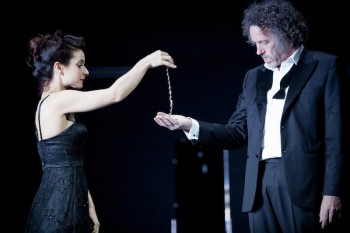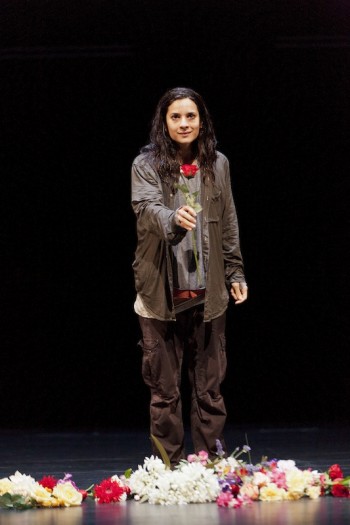Pygmalion – A Social Experiment

Pygmalion: It’s one of literature’s great experiments. Can Professor Henry Higgins, backed by fellow academe Colonel Pickering, transform a common flower seller into a proper lady with the diction of a duchess? It’s a formula that has been recreated, distilled into romantic comedy tropes (think Pretty Woman and My Fair Lady) over and over; usually the teacher and the student fall in love, lessons are learned on both sides, and we have a happy ending.
The source of the experiment in George Bernard Shaw’s Pygmalion doesn’t really come with a guaranteed happy ending, or love at all, and STC’s new production, directed by Peter Evans, embraces this. Higgins’ experiment is cruel: he barely registers that Eliza is a person as he works on transforming her; she is an incidental tool of his work, as inanimate as the machines he uses to record speech.
That cruelty is never underplayed in this performance. Marco Chiappi brings a devastating sharpness to Higgins that is wrapped up in the dismissive nature of those who are a little too cerebral, and while Colonel Pickering is truly a gentleman and a scholar, and affable to a point in the hands of Kym Gyngell, he too never appears affectionate of their charge, for all he offers her respect. Eliza is not really their concern – the game of language and training in phonetics is their sport.

This production in itself feels like an experiment and for that we probably have dramaturg Toby Schmitz to thank; he has led STC to ask how relevant this play remains as a discourse on the nature of identity. Happily (though unhappily for the general human race) we are still inherently classist, we still judge books by their covers. Maybe it isn’t so much about what constitutes a lady anymore, but we are still judged on our behaviour, and which social convention it follows or defies, and opinions are made accordingly. We hear it all the time – “if the protestors hadn’t resorted to rushing the Prime Minister we might have taken them seriously” and so on.
When Eliza tells us she is, in the world of the cultured, just a child, it still resonates. And when her makeover is complete and she can’t really go home kerbside with a basket of flowers, we still understand her displacement. She doesn’t belong in her old place in the social order, but she never really asked to be thrust into this new one, either, where all Higgins can tell her she can do now she’s improved is get married. Eliza’s a feminist character and she wasn’t looking for a husband, she was only looking for self-respect.
For all the incisiveness of the production, it’s still very funny. Shaw writes with cunning observational wit and Eliza’s debut in Mrs Higgins’ (Wendy Hughes) drawing room is genuinely hilarious – she says all the wrong things in all the wrong ways, and society is baffled, appalled, and enthralled by her – and that’s young Clara (Harriet Dyer), her mother Mrs Eynsford Hill (Vanessa Downing), and her son Freddy (the delightful Tom Stokes), respectively.
Robert Cousins’ set design and staging is minimalist and almost achingly so; the trappings of real life are as dismissed on stage as they are in the mind of Henry Higgins. While this allows an unimpeded look at the terrific acting on stage (led by the revelatory Andrea Demetriades as Eliza, whose gift is her subtlety; she makes even the broad cockney pre-transformation Eliza feel so authentic) it also creates a detachment between audience and production. We don’t engage with this play. We observe.
What an experiment. Shaw would probably be pleased with that metatextual touch.




Loved the direction and the cast but hated the set which echoed and lost people inexplicably.
Strangely poor enunciation from Chiappi as Higgins accompanied by annoying mannerisms perhaps intended to show an Asbergers afflicted genius. The cheapo non set deserves condemnation as it creates an echoing void into which acting and Shavian wit is allowed to disappear .